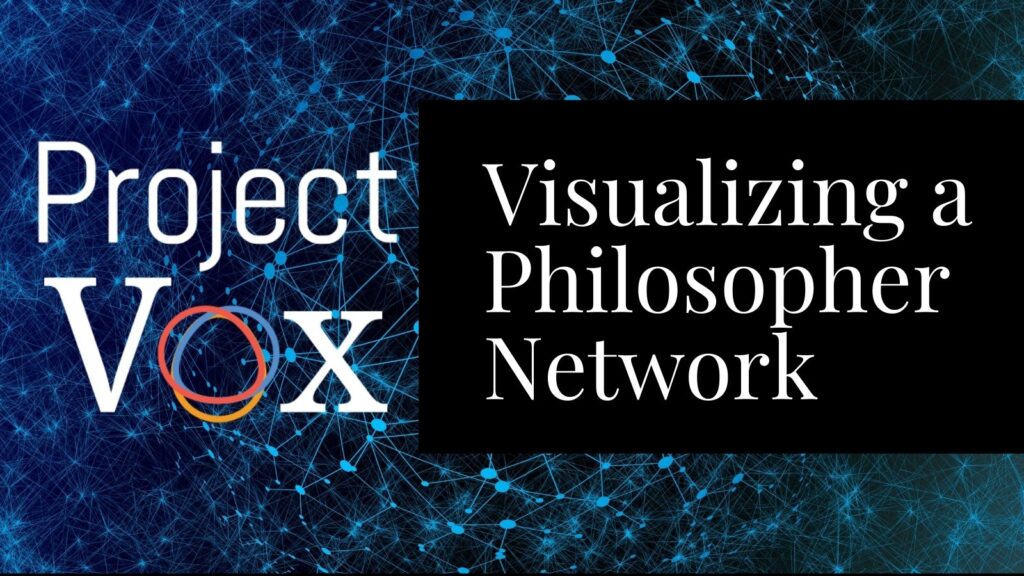Please enjoy a Behind the Scenes post that provides the story of two undergraduate researchers working to create our first network visualization. Please watch the video below where they explain their process.
Here is how the story begins: Duke Kunshan University students Karen Nielsen, majoring in philosophy, and Junyi Tao, majoring in data science, join the Project Vox Story+ team through the Duke Franklin Humanities Institute in Durham, North Carolina the summer of 2022. Project Vox’s mission is to expand and challenge the traditional philosophical canon by rediscovering and reconnecting philosophers who have been marginalized and excluded from history. Kelsey Brod, a PhD candidate in the Duke Computational Media Arts and Cultures program, and Emilie Menzel, a graduate student in the UNC Science of Library Science program, were crucial to facilitating discussions and guiding the team over the summer. As part of the Story+ team, Karen and Junyi tackled the question: how do we represent and visualize connections between philosophers and philosophical concepts as explainable knowledge networks? They spent many hours discussing and working in the cafeteria, Project Vox’s meeting room, hallways, outside, and pretty much everywhere they went.
After reviewing more literature, testing out ideas, and consulting with professionals, the question gradually shifted from “how do we make visualizations of philosophers?” to pondering: How can we represent philosophical concepts as data? How can we keep data grounded in its context? How can we make sure we aren’t oppressing or marginalizing others with the data? Why and how should we combine computational and humanities approaches to answer research questions?
Over the course of six weeks, they established a workflow for inputting, visualizing, and drawing insights from philosophical data: 1) design a unique methodology for data collection based on a goal, question, or hypothesis, 2) collect data and create a template for future data entry, 3) structure collected data as graphs and build a flexible graph database, 4) learn from the global and local features of stored graphs, 5) build visualizations from interpretations of the data, and 6) maintain and evolve the database and visualization(s) over time.
The team chose to use the “Introduction: The Republic of Women and the Republic of Letters” from Carol Pal’s Republic of Women: Rethinking the Republic of letters in the Seventeenth Century as the first data set to put this workflow into practice. Karen hand wrote a methodology for scrubbing data from philosophical texts. This attempt at a methodology highlighted the fact that one person could not design it on their own. Karen’s first draft was incomprehensible to anyone else who tried to read it. Collaboratively, Karen, Junyi, Kelsey, and Professor Janiak sat around a table and discussed a new format for inputting data. Junyi taught Karen the most basic of coding so that the second attempt could be recorded in a JSON file. From this JSON file, Junyi worked to be able to transform it into a graph database. A roadblock was found, however, when the Republic of Women was found to be more of a history of philosophy, rather than a philosophical work itself. The team shifted gears to have a new test data set: correspondences between philosophers Princess Elizabeth of Bohemia and René Descartes. The index from Lisa Shapiro’s book on the correspondences would go to form the “tags” attached to each letter. So far, Karen and Junyi have completed the workflow steps 1-4 on the correspondences between philosophers Princess Elizabeth of Bohemia and René Descartes.
In addition, Junyi coded in JavaScript to create a visualization, called Wiki InfluNet, of philosophers’ influence on each other from Wikipedia entries. Spending hours and hours analyzing the data, Junyi found a systemic marginalization of women philosophers by Wikipedia due to the absence of noted connections between women philosophers and their male contemporaries. The connections that Wikipedia seems to erase are present in Project Vox’s research—further highlighting the need for Project Vox.
Both Karen and Junyi will continue the work as their Signature Work, or the Senior Thesis, for the 2022-2023 academic year.


